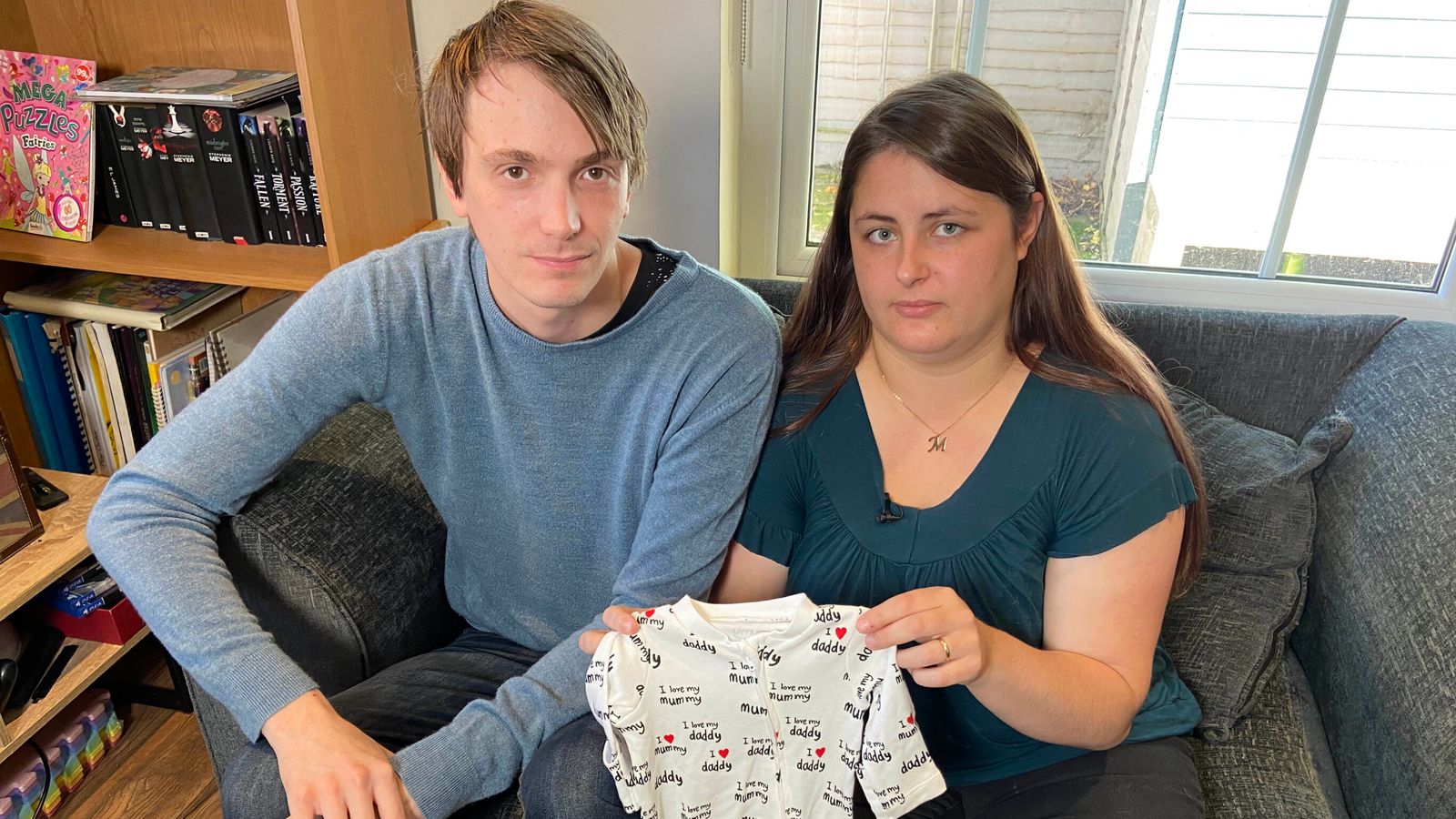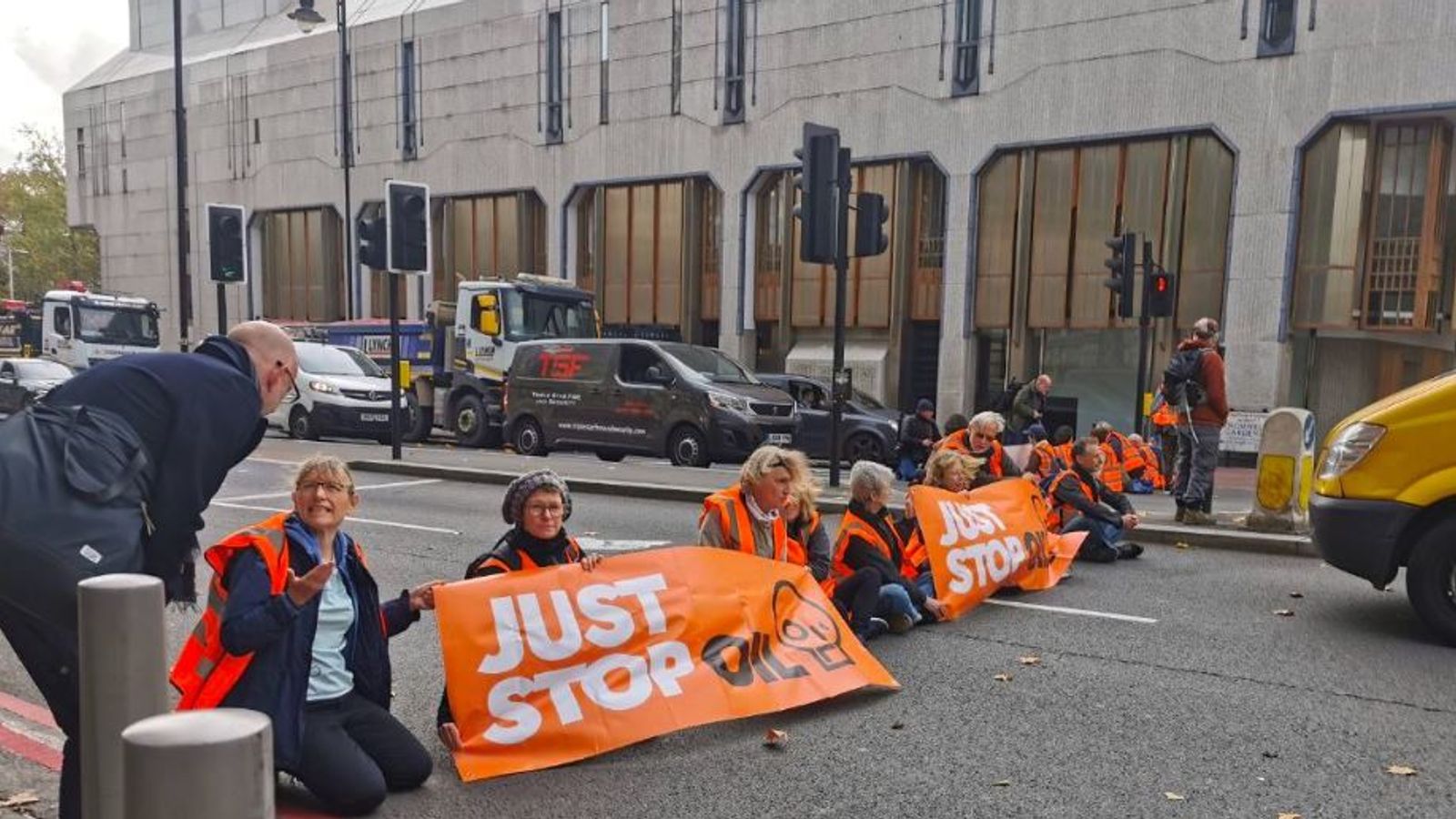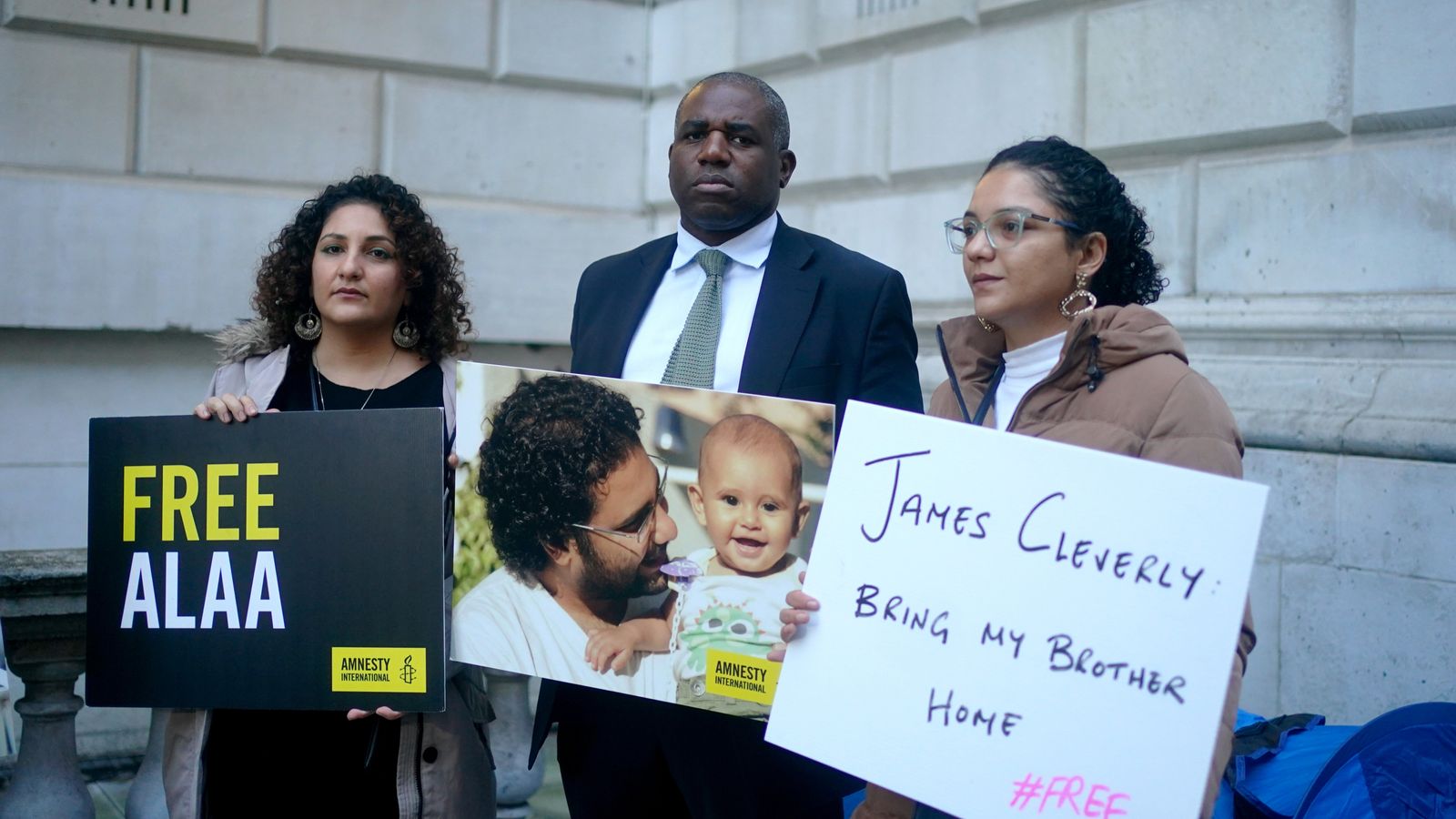In the autumn sunshine, a young couple walk hand-in-hand through a graveyard in Ludlow. They come here every week, to visit the quiet corner where their daughter is buried.
Mia Harwood should now be nearly seven months old. But the outfits they bought for her are kept in a memory box, alongside prints of the tiny hands they can’t hold.
Mia was stillborn on 3 April. Her mother, Hazel, was admitted to the Princess Royal Hospital in Telford the day after the Ockenden Review was published.
It was a damning report that blamed the Shrewsbury and Telford NHS Trust for the deaths of more than 200 babies.
It revealed a trust that failed to learn from mistakes, failed to properly monitor babies during labour and, in some cases, failed to perform caesarean sections that could have saved lives.
Staff told the review that the trust was very proud of its low caesarean rate, which was well below the national average.
From the moment she was admitted, Hazel was worried because tests had suggested she could have pre-eclampsia, a condition that can be dangerous and mean the baby should be delivered early.
At least 45 baby deaths could have been avoided at two Kent hospitals, report into NHS trust finds
NHS England setting up ‘war rooms’ to prepare for ‘toughest winter on record’
Staff at Kent NHS trust warned of ‘harrowing report’ into preventable baby deaths
During the final weeks of her pregnancy, she had repeatedly asked if she should have a caesarean section.
“With a first child you don’t know any different, so you think if they’re telling you this is safe then carry on. But every day I was asking if a C-section was safer,” she said.
Staff took the decision to induce her labour soon after her due date.
“I asked if it was safer just to get her out. They just kept saying we’ll carry on with the induction and see what happens.”
But after they had begun to induce her labour, she was told there would be a delay.
“They told us all the inductions had to be paused because the labour ward was full,” she said.
By the following evening there were concerns.
“I was sent up for a scan and they told me that she’d gone, there was no blood flow. They couldn’t hear anything or see anything.”
Her husband Sam arrived and Hazel continued to deliver Mia, who by then had passed away.
Midwife told Mia’s parents ‘sometimes it’s just you’
Their grief was then compounded by a midwife who spoke to them about what would happen next.
“They said oh, you know, she’s gone for a post-mortem and we’ll get some answers and she said ‘sometimes they don’t find anything, sometimes it’s just you’,” Hazel recalled.
“To have your daughter die and then a day later someone essentially blame you, that was just the worst thing you can say to anyone.”
The director of nursing at the Shrewsbury and Telford Hospital NHS Trust has offered “heartfelt condolences” to Mrs Harwood and her family, adding that “we know that during times of distress, communication and the use of language are key”.
“No individual should ever be left feeling that they are to blame.”
Investigations are ongoing into the cause of Mia’s death and Hazel is still awaiting the results of the post-mortem examination.
She believes her case raises questions about what was going on in a hospital where failings had been so publicly highlighted and promises had been made to improve.
“I understand that there are staffing issues throughout the NHS,” she says.
“But if you cannot look after your patients safely and listen to them, then should you really be continuing to offer the services?
“I think they should stop trying to delay C-sections because it’s not safe.”
Sky News has obtained an NHS document from 2010, entitled ‘Pathways to Success: a self-improvement toolkit. Focus on normal birth and reducing Caesarean rates’.
The document, which is over 100 pages long, details the ways in which hospitals can “assess their current practice in promoting normal birth”.
It states: “There was a general belief amongst clinicians involved in this project that maternity units applying best practise to the management of pregnancy, labour and birth will achieve a CS rate consistently below 20% and will have aspirations to reduce that rate to 15%.”
Benefits listed of reducing rates included “a sense of pride in units” and “opportunity for financial savings”.
Among the 27 trusts thanked for their contributions to the document were East Kent, Shrewsbury and Telford and Nottingham University Hospitals.
Parents of Harriet Hawkins: ‘Complete culture needs to change’
Harriet Hawkins was stillborn in hospital in Nottingham in 2016. Her parents, Jack and Sarah, both worked at the trust at the time.
Mr Hawkins, who left his job as a consultant in acute medicine while fighting a legal battle with the trust over the death of his daughter, says he believes there needs to be a fundamental change in maternity care across the country.
“There isn’t another branch of medicine that I can think of as a doctor where there are two teams of people trying to do exactly the same thing, but they have completely different ways of doing it and completely different backgrounds of how they’re trained and that is frightening,” he said.
“Midwives offered us aromatherapy when we had an obstetric emergency. They should have called the obstetricians to come and do an emergency caesarean section.
“I feel like the complete culture needs to change,” he added.
“And I think the decision that needs to be made is are we going to tolerate further harm to babies and mothers and dead babies and mothers in this country?
“In the name of all sorts of nonsensical desire of various professional people, or are we going to say that’s it? We don’t anymore. No more. That means teams working together. It means people being held to account.”
Donna Ockenden, the independent midwife who investigated the Shrewsbury and Telford NHS Trust, is now carrying out an inquiry into maternity services in Nottingham.
More than 700 families have already contacted the review team.
A spokesperson for Nottingham University Hospitals NHS Trust said they welcome the independent review, adding: “We are truly sorry we failed Mr and Mrs Hawkins and baby Harriet in the care delivered in 2016, and are doing everything in our power to ensure patients using our maternity services receive the best care possible.”
Earlier this year, NHS England told hospitals to stop using targets for caesarean section rates due to concerns about patient safety.
The Department for Health and Social Care says the document we obtained “is not representative of current government policy”.
Charity ‘receives over 1,000 calls a year over maternity care concerns’
But the charity Birthrights says it receives over 1,000 calls a year from women and healthcare professionals concerned about maternity care at trusts not confined to those already highlighted as having unusually high numbers of deaths.
Francesca Treadaway from the charity said: “We cover the entire UK and we’re receiving inquiries along these same lines from all over the country.
“It’s the breadth and complexity of the inquiries that’s growing along with the number of inquiries that we’re receiving.”
The most viewed page on their website remains a factsheet on the rights of women to have a “maternal request caesarean section”.
Since April, they’ve answered inquiries relating to caesarean sections at 30 trusts and health boards.
Midwives known as ‘the musketeers’ pursued natural birth ‘at any cost’
University Hospitals of Morecambe Bay NHS Trust admitted negligence after Toby Feasey was stillborn in 2017.
Staff at the Royal Lancaster Infirmary had failed to diagnose that his mother Jenny had pre-eclampsia.
The same trust had been found responsible for the deaths of 11 babies and one mother in a report two years earlier that found there was a “lethal mix” of failings in maternity care at Furness General hospital.
A group of midwives who were known as the “musketeers” were found to have pursued natural birth “at any cost”.
Jenny said: “You think after they’ve had all these issues and they’ve implemented new protocols and procedures and they assure everyone that everything’s going to be okay you do think, well, they will have learned from the lessons.
“But then you also think what would you do as an alternative, because where else is there to go that can guarantee suitable care that isn’t also struggling with problems?”
Stillbirth cases believed to be a ‘widespread issue’
Lucy Mellor, a medical negligence solicitor with the firm JMW, says they are “contacted on a weekly basis by somebody who has unfortunately lost a baby”.
They have handled hundreds of stillbirth cases from around the country and believe it’s a “widespread issue”.
“I definitely see patterns and themes cropping up in these sorts of cases and they tend to relate to the national guidelines not being followed,” she says.
“One theme, for example, is just the lack of general care. So things like mothers and babies not being monitored frequently.
“A general lack of midwives on duty is also a problem that we see quite often.”
In cases where women have been denied caesarean sections, she says “it comes down to the subject of informed choice”.
“There are certain women who fall into a high-risk category where in accordance with the guidelines you need to be having that discussion with them. You need to talk through their options.
“Obviously it’s up to them whether they go ahead and they decide to have a C-section, but if you don’t raise it with them in the first place and have that discussion where you’re talking about the risk to you, the risk to the baby and also the potential benefits for you and the baby, then there’s the potential for something to go wrong.”
‘We want staff to work together’
A spokesperson for the Department of Health and Social Care said: “It is vital that NHS trusts focus on safe, personalised care across maternity services, where the voice of the mother is heard throughout.
“We want NHS staff of all professions and disciplines to work together with women and families to deliver co-produced personalised and safe care.
“The NHS is investing £127 million in maternity services in the next year to help increase the maternity NHS workforce and improve neonatal care.
“This is on top of £95 million invested into the establishment of 1,200 midwives and 100 consultant obstetricians.”
Read more:
The babies who died in the UK’s worst maternity scandal
Mr and Mrs Hawkins say change is happening too slowly – meanwhile, parents are having to live with avoidable loss, with every season bringing fresh pain.
“That’s kids not going out trick or treating, that’s empty space under the Christmas tree,” Mrs Hawkins says.
And Mr Hawkins fears what is still to come.
“There will be other parents like us. They just don’t know who they are yet,” he warns.









